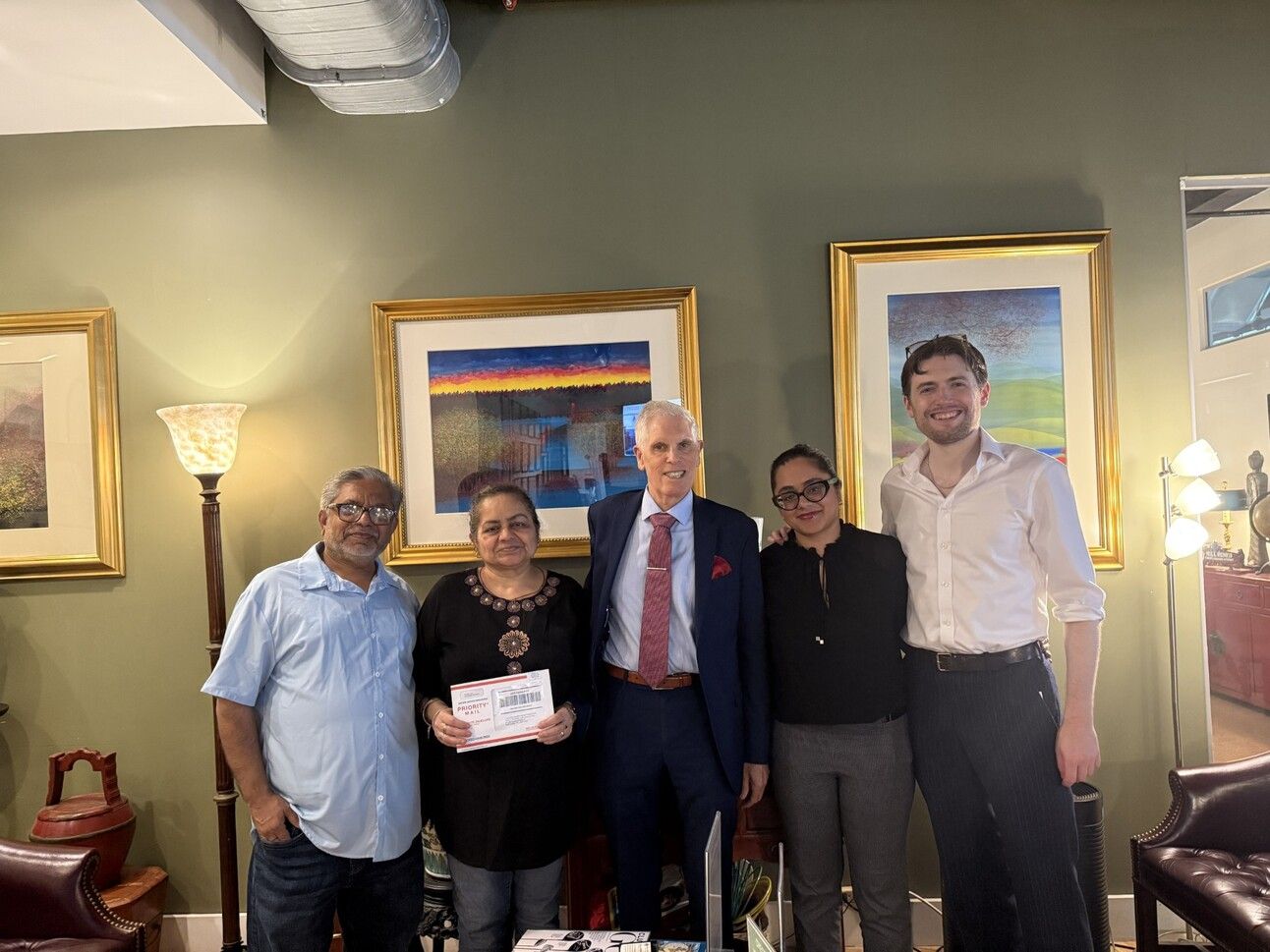- The NawLaw Report
- Posts
- NawLaw News: This Week's Highlights
NawLaw News: This Week's Highlights
Welcome Back! 👋🏼
Dear Readers,
Welcome back to NawLaw News, where we bring you updates and announcements from the Firm, as well as the latest news in the rapidly changing U.S. immigration world. With President Trump’s second term, there’s no been no shortage of activity, including frequent policy changes and ongoing legal battles. Let’s get you caught up!
Table of Contents
Trump Administration Ends Protections from Deportations for Honduras, Nicaragua
The Department of Homeland Security (DHS) announced it will end Temporary Protected Status (TPS) for over 52,000 Hondurans and nearly 3,000 Nicaraguans who have lived in the U.S. since the late 1990s following Hurricane Mitch. Homeland Security Secretary Kristi Noem stated that the countries have recovered sufficiently from the disaster, and it is now safe for their citizens to return home. The TPS program, originally intended as a short-term solution for people unable to return home due to crises, has come under scrutiny by the Trump administration, which views it as an overextension of immigration policy. This decision is part of a broader rollback of TPS under Noem, affecting people from countries like Haiti, Venezuela, Cameroon, and Afghanistan. Critics, including Democratic lawmakers and immigration advocates, argue that rescinding TPS harms law-abiding residents who have built lives in the U.S. over decades. Senator Catherine Cortez Masto condemned the move, emphasizing the contributions of these long-term residents to American communities.

Photo by Neil Weinrib
Judge Blocks Trump’s Rule Barring Migrants at US-Mexico Border from Claiming Asylum
A federal judge, Randolph Moss, blocked a Trump administration policy that barred migrants crossing the U.S.-Mexico border from seeking asylum, stating the administration exceeded its legal authority. Moss emphasized that the president cannot override immigration laws enacted by Congress, marking a significant legal defeat for a central Trump immigration policy. The lawsuit, filed by immigrant rights groups like the ACLU, argued that the policy endangered lives and unlawfully denied asylum protections to vulnerable individuals. In his decision, Moss declared that neither the Constitution nor immigration statutes permit the president to unilaterally deny asylum access to people already on U.S. soil. While the ruling was stayed for 14 days to allow appeal, DHS officials criticized Moss, calling him a “rogue” judge and vowed to fight the decision. The case highlighted deep tensions over presidential immigration powers and raised serious concerns about the enforcement and legal limits of such executive actions.

Photo by Neil Weinrib
DOJ Looking at Denaturalization for American Citizens Convicted of Certain Crimes
The Department of Justice (DOJ) is ramping up efforts to revoke U.S. citizenship from naturalized Americans who commit certain crimes, according to a memo from Assistant Attorney General Brett Shumate. U.S. attorneys are granted broad discretion to pursue denaturalization cases, especially those involving national security threats, war crimes, or human rights violations. However, the memo also encourages pursuing cases involving less severe offenses, such as undisclosed criminal records or errors in the naturalization process. Immigration attorney Rosanna Berardi notes that this marks a significant shift from past practice, where denaturalization was rare and typically reserved for extreme cases. Historically, such cases averaged just 11 per year from 1990 to 2017, but under Trump’s first term, the number of referrals surged dramatically. The memo also outlines other DOJ priorities, including combating antisemitism and challenging sanctuary jurisdictions.

Photo by Max Klebba
What’s Next for President Trump’s Birthright Citizenship Order in the Courts
A federal judge in New Hampshire has issued a nationwide injunction blocking President Trump's executive order that seeks to end birthright citizenship for children born to undocumented or temporary residents. The ruling halts the order from taking effect, but includes a seven-day stay to allow for appeals. Trump’s order challenges the 14th Amendment, which guarantees citizenship to anyone born in the U.S., a principle upheld by the Supreme Court in the 1898 Wong Kim Ark case. While the Supreme Court recently limited the use of nationwide injunctions, it left room for class-action lawsuits to block such orders, which is how this challenge is proceeding. Legal experts, including Boston College law professor Daniel Kanstroom, predict the case will ultimately be decided by the Supreme Court due to its massive implications for immigration and constitutional law. Multiple other lawsuits and legal battles across the country are also underway, reflecting the broad resistance to Trump’s attempt to redefine a longstanding constitutional right.

Photo by Max Klebba
How US Views On Immigration Have Changed Since Trump Took Office, According to Gallup Polling
New Gallup polling shows a significant rise in positive views toward immigration among U.S. adults, including Republicans, just months after President Trump returned to office. Overall, 79% of Americans now say immigration is a “good thing” for the country, up from 64% last year, marking the highest support in nearly 25 years. Republican attitudes have shifted most dramatically: two-thirds now see immigration positively, up from 39%, and fewer (48%) want immigration levels decreased, down from 88% a year ago. Most Americans—across party lines—also support a pathway to citizenship for undocumented immigrants, with 85% favoring it for those brought to the U.S. as children. While Trump’s administration pursues mass deportations and restrictions, these trends suggest growing public resistance to such policies. The polling indicates Americans are increasingly valuing immigration’s role, even as Trump continues to push his hardline agenda.

Photo by Neil Weinrib
Trump’s ‘Big, Beautiful Bill” Gives ICE Unprecedented Funds to Ramp Up Mass Deportation Campaign
President Trump’s recently signed immigration enforcement law, dubbed the "big, beautiful bill," allocates a record $170 billion toward border security and immigration enforcement, with $75 billion directed specifically to Immigration and Customs Enforcement (ICE). This unprecedented funding aims to supercharge mass deportation efforts, expanding ICE's detention capacity to over 100,000 beds and enabling the hiring of 10,000 new deportation officers. The bill also invests $30 billion in the deportation process, including transportation, legal staffing, and partnerships with local law enforcement. Additionally, $46 billion is earmarked for border wall construction and related Customs and Border Protection projects, while $13.5 billion will reimburse states for prior enforcement actions, such as Texas’ Operation Lone Star. ICE’s acting director praised the law as essential to protecting communities, but critics warn of humanitarian abuses and overreach. Immigration advocates argue that this level of funding enables an extreme enforcement agenda that could result in mass detentions and deportations on an unprecedented scale.

Photo by Max Klebba
Client Q&A
Q.“I want to ask about the removal of conditions (for I-751) that I need to file soon. We are planning to take a 6weeks vacation to the Philippines with my husband and baby from November 2025 until the first week of January 2026, and I am wondering if it is safe to travel while my documents are being processed (hopefully by that time) and if you know anything that we need to do/bring with us during that time. My current green card expires on March 18, 2026?” - a client from the Philippines
A. At this time, we are not aware of any travel-related issues involving clients traveling internationally while their applications for removal of conditions are pending with USCIS.
Q. “We will be coming to the US this Monday. My parents have been out of the U.S. for more than 8 months, while I have been gone for about 3 months, should we be concerned?” - client from India
A. We have heard from many clients who have been outside the U.S. for 3 or more months that they are being questioned by CBP at the port of entry regarding their lengthy absence. However, the good news is that they have been admitted and told not to remain outside the U.S. for an extended period of time.
Q. “If my potential employer owes money to the IRS but is paying in installments, can he participate in the Lottery? And if an employee is not selected can the employer process an EB-3 application for me?”- client from Bangladesh
A. The employer’s tax obligations are not a factor in the H-1B lottery. And if you are not selected, it is still feasible to proceed with a PERM/green card under the EB-3 category.
Exciting Events at NawLaw: Stay Informed and Engaged!
Congratulations to our NawLaw Clients who’ve Received their Green Cards and Work Permits! 🎉
We’re so proud to be part of your journey and celebrate this huge milestone with you!
Here’s to new beginnings and endless opportunities!
🌟🌟🌟🌟




Don’t forget to follow us on TikTok, Instagram, and Facebook! 📣
@neilweinrib The Justice Department is prioritizing denaturalization of some naturalized citizens. Poor conditions in ICE custody have led to migrant ... See more
@neilweinrib The U.S. now requires F-1 and J-1 visa applicants to make social media profiles public and undergo screening for hostility toward the U.S.... See more
@neilweinrib The Trump administration has informed approximately 500,000 migrants from Cuba, Haiti, Nicaragua, and Venezuela that their legal status is... See more
We Are Your Trusted Source for U.S. Immigration!
For over 40 years, NawLaw has built its winning reputation based on obtaining terrific results, unrivaled expertise, personalized service, sensitivity to the needs of our clients, and, most importantly, achieving tremendous success! Our expertise and reputation for success speak for themselves! NawLaw is proud to be a trusted law firm as well as a leading force and “X” factor for foreign nationals and investors interested in studying, living, and working in the U.S., companies in the U.S. seeking their services, and companies abroad seeking to transfer key personnel to the U.S. We are proud to be regarded as the “go-to law firm” for U.S. immigration! Our reputation as the premier immigration law firm is based on our unwavering commitment to achieving exceptional client results and providing outstanding, personalized service. Given the many challenges immigrants face in the U.S., we are lawyers you can trust to get the results you want! There is no substitute for experience!
We Are Lawyers You Can Trust – We Walk It Like We Talk It!
Call us today or Visit Our Website to get your immigration process started! And check out our social media updates on Twitter, Instagram, Facebook, and YouTube.
Call us 212-964-9282

Immigration Done Right!